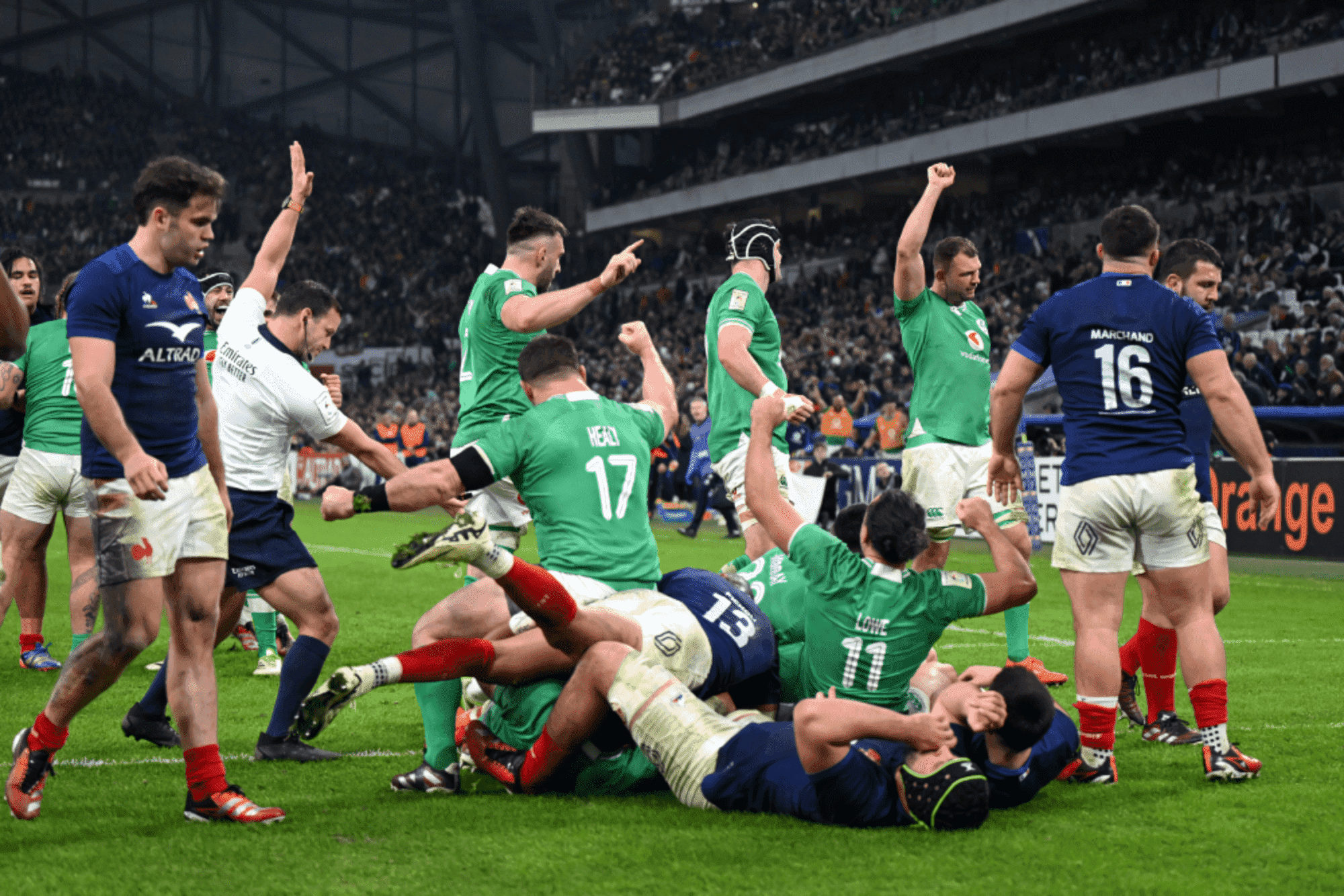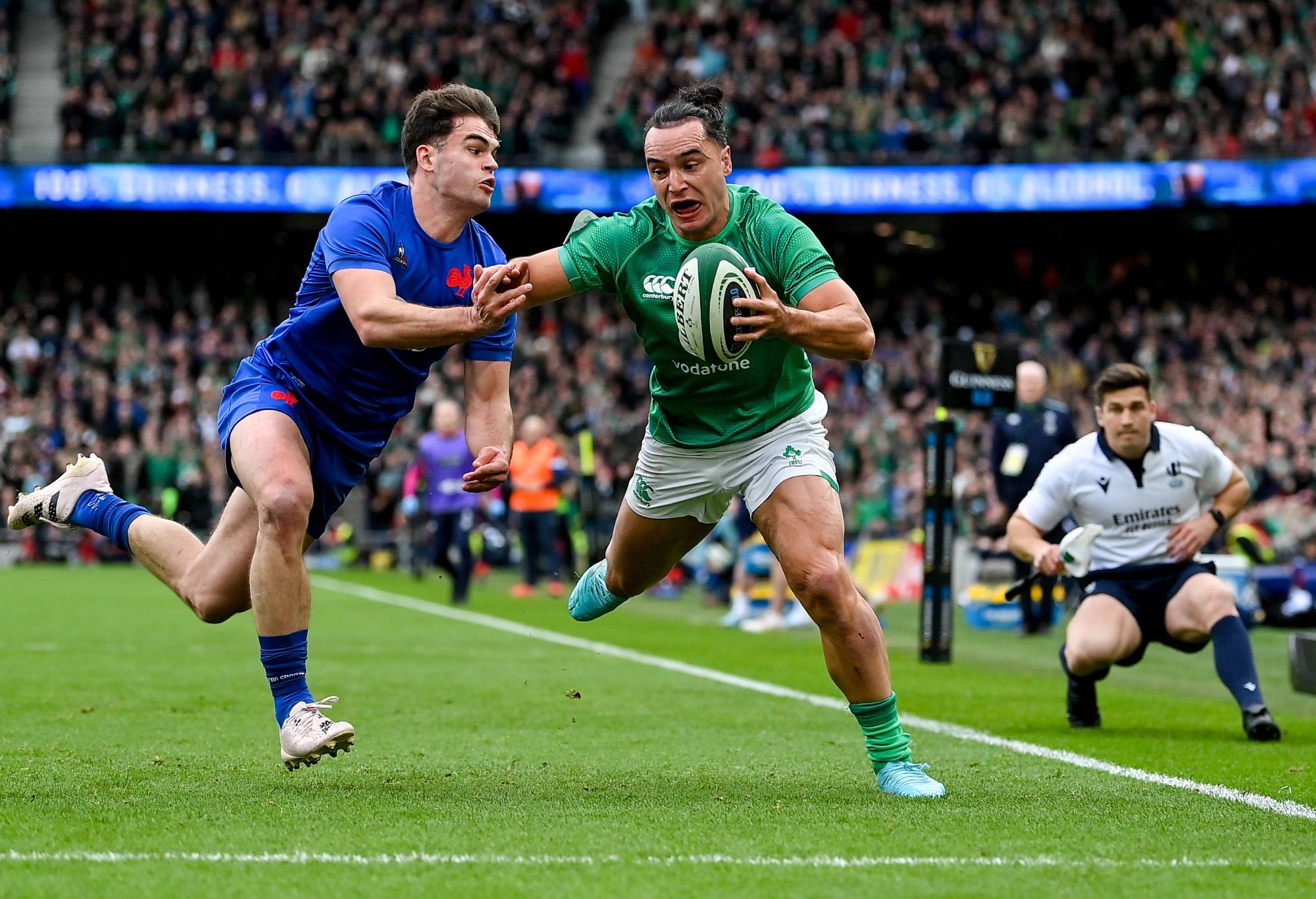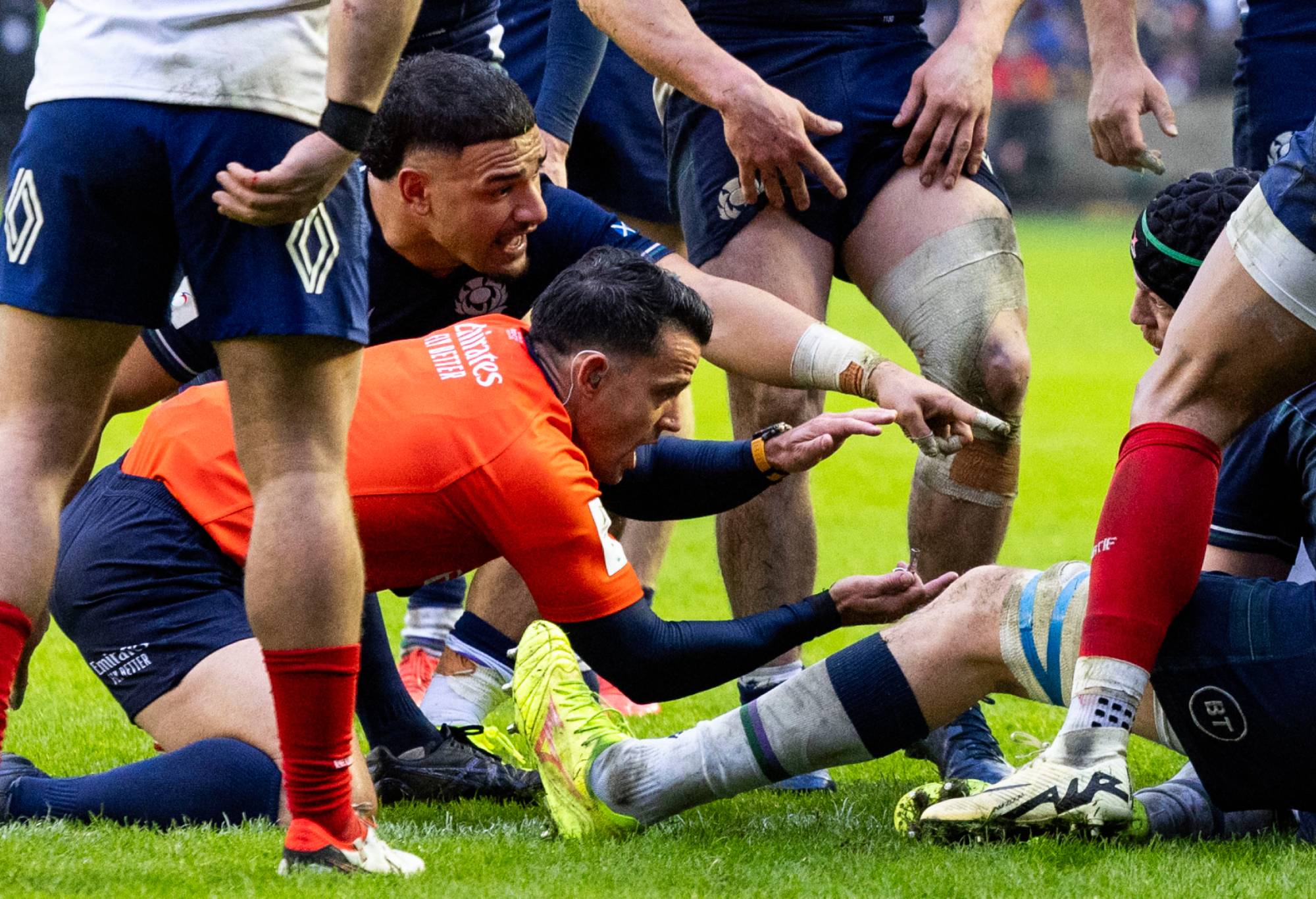Round One of the frontloaded 2024 Six Nations pitted the top two northern teams against each other. It was not the contest we expected.
Round Two featured two challengers trying to stay unbeaten to allow the tournament to retain suspense. England did just enough; Scotland might have too but lost anyway.
Thus, the championship is poised. If England’s grinding style overcomes mercurial Scotland in Edinburgh, they will carry the coveted Calcutta Cup into Round Four at Twickenham for what is likely the decider.
Watch every match of Super Rugby Pacific ad-free, live & on demand on the Home of Rugby, Stan Sport
What have we learned from these two rounds?
Ireland is not in decline
Ireland might be getting even better.
In the middle of their 17 Test win streak, a year ago, Ireland defeated France in Dublin by 13 points, scoring four tries to one, in a 76-kick grinder, winning the territory battle decisively.
Andy Farrell’s team have reacted far better to their quarter-final chastener than Fabien Galthie’s fragile French: rather than retrench or revanche, the Irish have upped the ante on defence, seeking dominant tackles and turnover ball.
To be clear, the two quarter-finals were indeed important to each of the top two Northern sides. After their 36-14 demolition of Scotland and gripping 13-8 conquest of the Springboks, none other than Gregor Townsend stated: “The way Irish rugby is set up, they could dominate world rugby for five or ten years.”
We know what happened next, and this will help Farrell keep his team vigilant. They will want to go on tour to South Africa with a five-Test winning streak, challenging the Cup champions again, on home turf.
All the signs point to Ireland lapping the Northern Hemisphere field.
Their latest win over France (38-17) was in France and featured a 13-kick Irish margin (James Lowe seemingly despising the ball itself, as he kicked the life out of Thomas Ramos) as well as going plus-6 on turnovers.
Rather than avoiding the appearance of impropriety to win the penalty count, the Irish poured into rucks and tackle zones, being on the wrong side of the whistle for only the fifth time since July of 2022.
In round two, Ireland blanked attack-minded Italy 36-0. Ireland played Italy twice in 2023. The scorelines were 34-20 and 33-17, respectively. The set piece improvement (a perfect lineout so far, and a scrum that is even on penalties won and lost) is part of that, plus muscling up at lock and flyhalf, but the mentality on defence has also shifted.
In 2022 and 2023, Josh van der Flier was invariably the top tackler, routinely topping 20 in a game. So far in 2024, the tackle load has been spread across the board; with team tackles turning the ball over.
Taking chances in the tackle zone has led to Ireland being the bottom of the log (84.8%) on tackle success, a metric which is almost worthless in modern rugby union, because blitz defences seek to split attacks or corral them behind the gainline with shooting defenders who often miss the tackle but succeed in their mission by funneling carriers into breakdown they will regret. (Stats provided by OptaJonny on the excellent theanalyst.com).

Ronan Kelleher of Ireland (obscured) scores his team’s fifth try during the Guinness Six Nations 2024 match between France and Ireland at Orange Velodrome on February 02, 2024 in Marseille, France. (Photo by Shaun Botterill/Getty Images)
The upshot is only 2.7% of Ireland’s missed tackles have led to a try compared to 17.1% for Wales.
The attack is still devastating: easily getting over the gainline via two second rucks (60% of Irish rucks are sub-three seconds) and featuring more offloads at an 88 per cent success rate. Ireland has more red zone entries and averages 7.22 points per entry, which seems impossible.
Even if you add Italy’s points to France’s, Ireland have scored more. Add the tries scored by France, Scotland and Italy: you will have the Irish total (11) so far.
If the excellent Jack Crowley’s work off the tee (less than 70%) ticks up to four of five, the margin grows even more.
Ireland’s captain for the day, Caelan Doris reflected his coach’s focus, when he said Ireland “enjoyed the nil part” of the win over Italy.
With all the fuss over their multilayered attack, Ireland’s edge over rival France is starker in defence: since the start of the 2022 Six Nations, Ireland has conceded only 12 tries, whilst the French have leaked 27.
Farrell is rarely gushing, but his post-match praise comes close: “At times I thought our defence was well in control, which is unbelievably pleasing.”
Finally, their depth means that Ireland are no longer dependent on any one player, as France seem to be. Stuart McCloskey and Robbie Henshaw are pushing Bundee Aki and Garry Ringrose, stalwart James Ryan is now a bench lock behind the very large Joe McCarthy, and Jack Conan is an able substitute.
The Triple Crown begins now, and we can all see the narrative building towards ‘can Ireland save positive rugby by defeating grim England?’ along with Irish Times articles entitled ‘Is this the best Irish rugby team ever?’ (Mary Hannigan) and ‘For the sake of rugby, Ireland need to win another Grand Slam’ (Gerry Thornley) and The Irish Independent pieces like ‘Ireland so far above their foes that repeat Grand Slam is already theirs to lose’ (Ruaidhri O’Connor) and ‘Ireland in Grand Slam driving seat.’ (Ciaran Kennedy in the42.ie).
Ireland has always been a modest, self-effacing place and culture; but winning has a way of changing us.
England still have teeth
England are focused on winning, not style.
Steve Borthwick reduces rugby to the essence: simple steps to a win.
As the blitz defence of Felix Jones beds in, the attack has ossified.
England have played the bottom two teams and scored four tries (two less than Wales) with the worst points-per-entry rate in the competition (3.45), glacial rucks (almost 22 percent have lasted over six seconds, far and away the slowest, twice as effective as Ireland) and only as many offloads as Nick Tompkins by himself. Ethan Roots is almost the only consistent cleanout player for England; Ireland has four forwards meeting or exceeding him. He is also one of only two English players with a (one) breakdown steal.
Ben Earl has been adding bulk (he is 2kg heavier than in the World Cup) but is not big enough to overpower Ireland from a simple pick and go at a scrum in Round 4.
This will not bother Borthwick, yet.
Win in Edinburgh and it will set up the actual match of the tournament, at Twickenham.
England has struggled for punch over the gainline but will welcome Manu Tuilagi, Ollie Lawrence, George Martin, and Luke Cowan-Dickie back to the fray, all of whom offer a little something in yards after contact.
Nothing helps cleaners more than a carrier who is hard to bring down, and Martin will shore up maul stops.
The Felix Flex, which lacks the kind of double-back agile wings Jones was used to at Team Bok, and Finn Russell will want to stress it with kick-passes, chips, and delayed inside balls.
This may result in a need to score more than the 16 points the Semi-Sweet Chariot managed against young Wales.
Calcutta Cups have had a haggis flavour lately: in the last six staged, only one went England’s way.
The difference is this squad showed it can manage tight matches, squeaking by in eight of their last nine Tests, with only the late 15-16 loss to the Boks the anomaly.
Clear and cryptic closeout kings versus the disgruntled poets of mad Murrayfield: this is what Round 2 set up.
Essential England are led by a technician, fullbacked by a basic catch man, and managed by a Ford, not a Ferrari.
The only flash is their (excellent) social media.
France are becoming French again
Set aside the grounded ball which was seen and then disregarded in search of some esoteric certainty.
France is a full-blown introspective crisis.
Paul Willemse, he who saw red twice in Round One, has spoken to the French press of his ‘responsibility and guilt’ and being ‘cursed by force’ but also noted ‘teams that are too clean won’t win anything; look at South Africa, New Zealand and even Ireland.’
Ramos, whose play seems the bellwether of French fortunes lately, spoke of ‘joy’ and a ‘new adventure’ and the need to feel ‘free’ again by ‘adapting vision and not being so stressed; so tense.’

Ireland’s James Lowe (right) holds off France’s Damian Penaud on the way to scoring their side’s second try of the game during the Guinness Six Nations match at the Aviva Stadium in Dublin, Ireland. Picture date: Saturday February 11, 2023. (Photo by Brian Lawless/PA Images via Getty Images)
He and the rest of his back three are acutely aware they are now targeted, after the Boks’ examination, as weak under the high ball. Ramos has been working on maintaining speed under the ball, instead of leaping straight up. Damian Penaud has also been in his head, working out angles. Louis Bielle-Biarrey has an immutable problem: he is short, but lacks Cheslin Kolbe’s and Kurt-Lee Arendse’s leaping ability.
Having overplayed in their doomed quarter-final, France are clearly being told to play less by coaches, ‘not to waste ammo,’ and to ‘occupy the pitch.’
All in all, it looks like France have taken a step back, just as their captain and best backline player is out and gone, seeking Olympic gold.
Now, Greg Alldritt, who has been the only peak performer, is out.
Their lineout has been woeful, with super-carrier Peato Mauvaka unable to find one of five jumpers. Success at this set piece was crucial for French success in 2022 (91%) and 2023 (88%); now it is struggling at 79% with even some of those ‘wins’ being too sloppy to use.
Ball retention is poor; perhaps the worst in the competition.
As the top French sports newspaper put it: “The only thing that was beautiful was the victory.”
A game against Italy comes at the perfect time in Round Three.
Scotland’s painful sliding doors moment
There are very few more painful ways to lose a match than Scotland just experienced.
Yes, we can always say the match was lost at the end of the first half when the Scots opted for a fateful scrum (which, bolstered by the return of Uini Atonio, resulted in a momentum-killing penalty) instead of a simple tap-and-go against tired and short-handed defenders with a referee itching to card again, or just a simple three; but somehow that seems too exculpatory.
Scotland had to score a try to win and they did just that, with their star players like Russell doing what stars are meant to do. When Sam Skinner moved the ball off a French leg and grounded it, both the camera and common sense told us the try had been scored.
The law allows a referee to pose the question to the TMO without setting the bar so high as to require “conclusive” evidence, which may have helped, but in reality, even using the “beyond even unreasonable doubt” standard apparently used, the ball was clearly grounded, as the TMO admitted in round four of the ten confusing dialogues.
Rugby says it wants to reward attack. Sam Skinner attacked the line. France tried to obscure the touchdown but were unsuccessful. Skinner moved the ball from a prone boot to the line. It was easy to see.

Referee Nic Berry checks to see if Sam Skinners try has been grounded at Murrayfield Stadium, on February 10, 2024, in Edinburgh.
This is not an attack on referees.
For some time, we have been asking for refs to be restored to the final arbiters, with the caveat in Test rugby when technology allows that a “footage manager” perhaps could assist the ref in putting a big clear image on the big clear screen if he wants to look at it closer.
The role division between TMO and ref seems to be the culprit here, along with a premature guess at “held up” when the clock is dead and the game is in the red and there is no rush to judgment. Just say you are not sure, ask for the best image, and voila, the grounding would have been easy to see and award.
Now, Scotland is asking World Rugby to acknowledge fault, which we can predict is a futile endeavour.
Scotland has found a fullback, to augment Blair Kinghorn and Kyle Rowe.
Australia would be wise to study the game of young (born 2001) Harry Paterson, in only his ninth professional 15s game (he had been a Sevens player), defusing long French bombs. He has been tutored by Emiliano Boffelli (the ‘Boff’ as Harry calls him) on how to claim high balls.
A late selection when Kyle Steyn pulled out to attend the birth of his child, Paterson (no relation to Scotland great Chris) threw up and then pulled up his socks and looked like he was channeling his inner Hugo Keenan, joining the line, creating a try, handling his position, and even making Russell smile.
A keynote: hooker George Turner was pulled off for a head check due to a signal from his high-tech mouthguard, which measured a tackle by Charles Ollivon at 70G (on par with a car crash). He returned.
So where do Scotland go from here? A very unsatisfactory déjà vu in which they may ruin English hopes and use just that one win over the Auld Enemy as a sign of success, when they could and should have been in the running for the actual title.
Their pack is hard enough, their midfield dynamic enough, their halves supremely talented, and their coach an honest man. But they were not grounded enough.
Wales are graded on a curve
Welsh rugby has been travailing through so much abject misery lately – an 0-2 start is being met with joy – because a preposterously young team lead by a 21-year old lock has taken Scotland to the brink (and scored four tries) in Cardiff, and then made England sweat to a two-point survival at Twickenham.
Two matches, two losses, but this tournament was always set up by Warren Gatland as a full on rebuild project, which means all Wales need to is beat Italy at the Principality in the final round, when the visitors’ depth is likely plumbed, and the ‘good’ defeats to the Home Nations will be seen as progress.
Wales remains a difficult team to play. Tommy ‘Turnover’ Reffell might personify the Dragons with his imperviousness to pain, odd ability to read the illegible at ruck times, and knack of negating phase attacks.
They will enjoy the rare event of scoring a maul penalty try at Twickers, a breakaway for Alex Mann to finish, and a press at the end to give England heart palpitations.
Reactions to the match seemed to give Wales the moral victory, showing perhaps how low their expectations are now.
“We are going to be a good team,” said Gatland afterwards. “It’s just going to take a little bit of time. I thought we showed some great character.”
This is what every coach says after a loss if they can get away with it.
Gatland has and will.
Italy are forever about to get there
Italy have scored an average of a dozen points so far, with four entries into the 22m per match, still stubbornly refusing to kick the ball, which is giving their opponents a short field to attack in.
To put it in context, Italy have kicked 35 times fewer than Scotland in two rounds. Thus, they have been forced to make 158 more tackles than Ireland already. It does not matter if it ‘looks good.’ It is bad rugby.
Now, beaten and bandaged, they face France in a bad mood. The last time they played, France won 60-7.
Harry Jones’ Team of the first two rounds
Cyrille Baille (France), George Turner (Scotland), Finlay Bealham (Ireland), Joe McCarthy (Ireland), Maro Itoje (England), Rory Darge (Scotland), Tommy Reffell (Wales), Jack Conan (Ireland), Ben White (Scotland), Finn Russell (Scotland), James Lowe (Ireland), Stuart McCloskey (Ireland), Robbie Henshaw (Ireland), Kyle Rowe (Scotland), Harry Paterson (Scotland).































































































